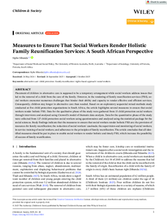Placement of children in alternative care is supposed to be a temporary arrangement while social workers address issues that led to the removal of a child from the care of the family. However, in the rendering of family reunification services (FRS), social workers encounter numerous challenges that hinder their ability and capacity to render effective and efficient services. Consequently, children stay longer in alternative care than needed. Based on an exploratory sequential mixed-methods study conducted at five child protection organisations in South Africa, the article highlights several measures to ensure that social workers render holistic FRS. Data for the qualitative phase of the study were gathered from 15 child protection social workers through interviews and analysed using Creswell's model of thematic data analysis. Data for the quantitative phase of the study were collected from 127 child protection social workers using questionnaires and analysed using the statistical package for the social sciences. Study findings indicate that the measures to ensure that social workers render holistic FRS are: the provision of resources for family reunification; the reduction of social workers' caseloads; the supervision and monitoring of social workers; in-service training of social workers; and adherence to the principles of family reunification. The article concludes that all identified measures should be put in place to enable social workers to render holistic and timely FRS, which increase the possibility of success of family reunification.

